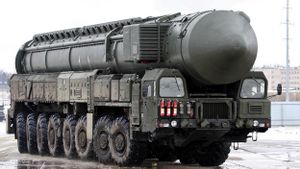JAKARTA - The team of former US President Donald Trump may not return all the classified documents taken from the White House at the end of his presidency, even after the FBI searched his home, US prosecutors warned on Thursday, calling it a potential national security risk that needs to be investigated.
The revelation comes in a Justice Department court filing, asking District Judge A.hat Cannon to let him continue to review about 100 secret records confiscated by the FBI at Trump's residence in Mar-a-Lago, while investigating whether classified documents were illegally transferred from the White House and kept incorrectly there.
Trump is being investigated for keeping government records, some of which are flagged as highly classified, at a resort in Palm Beach, Florida, home after leaving office in January 2021.
100 documents represent a fraction of the more than 11,000 records and photos confiscated, most of which Trump says will review because they are not classified.
"This motion is limited to confiscated confidential records, as aspects of the order will cause the fastest and most serious losses to the government and the public," the department said in its court filing.
Prosecutors also asked judges not to allow independent arbitrariers, called "special masters," to review classified material confiscated from Trump's properties.
Previously, Trump, in an upload on his Truth Social platform, described the request as a waste of money.
The Justice Department on Thursday estimated there may be more classified records issued from Trump's White House that investigators have yet to find.
The revelation comes about a week after the Justice Department released a detailed list of properties confiscated from Trump's house, which shows the FBI found 48 empty folders labeled classified and 42 others indicating that they should be returned to the secretary's staff or military aides.
Legal experts are confused as to why the folder is empty, and it's not clear if any records are missing.
"Without delays, the government and the public will also suffer losses that cannot be corrected from the delay in inappropriate criminal investigations," wrote the prosecutor.
"An order against the use of classified records in criminal investigations could hinder efforts to identify the existence of additional confidential records that are not properly stored, which in turn present a potential sustainable risk to national security," they added.
Prosecutors asked Cannon for a verdict on September 15. If he rejects their request, they intend to appeal to the Atlanta-based 11th US Circuit Court of Appeals, where six of the 11 active judges are people appointed by Trump.
In an order late Thursday, Cannon gave Trump lawyers until Monday morning to respond to government requests.
Cannon, also appointed by Trump, on Monday ordered prosecutors to stop reviewing more than 11,000 recovered records, while a special master was appointed to review the matter.
Meanwhile, the Justice Department said it would award a court list of special potential masters on Friday, which may be in a joint filing with Trump's lawyers, as Cannon requested.
The Justice Department is also investigating a possible obstruction of justice, after finding evidence indicating that records may have been deleted or hidden from the FBI, when sending agents to Trump's home in June to try to recover all classified documents through a jury summons.
Cannon granted Trump's request for a special master, despite objections from prosecutors.
The judge said the special master would review documents not only covered by attorney-clien privilege, but all records that may be covered by executive privilege as well.
It is known that executive privilege is a legal doctrine that can protect some of the president's records from disclosure.
The Justice Department has challenged the logic of using executive privilege, as Trump has no record and is no longer president. The reason Cannon was also criticized by Democratic and Republican law experts.
"There is no potential statement regarding executive privilege that could justify the restrictions on executive branch reviews and the use of classified records at issue here," the Justice Department wrote in its filing on Thursday.
On Cannon's orders on Monday, he authorized US intelligence officials to review all the confiscated material, as part of an assessment of ongoing national security damage.
But the Justice Department said there was no way to stop criminal investigations and a national security review.
"The ongoing review and assessment of the Intelligence Community's classification are closely interrelated, and cannot be easily separated from the ongoing field of DOJ investigations and FBI criminal investigations," prosecutors said.
The English, Chinese, Japanese, Arabic, and French versions are automatically generated by the AI. So there may still be inaccuracies in translating, please always see Indonesian as our main language. (system supported by DigitalSiber.id)













